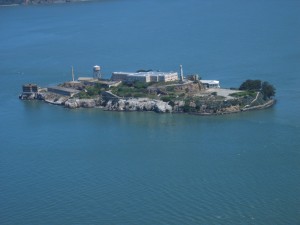At that point they inflated the raft and left the island. After that, nobody seems to know what happened.
JOSHUA JOHNSON: I wonder why this case is still relevant. Is there a point at which the U.S. Marshals Service considers it OK to stop looking?
MICHAEL DYKE: The U.S. Marshals Service continues to look for anybody with a federal warrant until such time as we can determine that person to be dead or in custody, or 99 years old.
JOSHUA JOHNSON: Have there been many leads in the case?
MICHAEL DYKE: There have been many, many leads that really never panned out. There are a lot of leads in foreign countries, and those are difficult to follow up because of lack of record-keeping or lack of information. Even the leads in this country are very old, so it's hard to trace that information.
Fortunately there are a lot of records that are still around. But others have been destroyed and some witnesses have died. You can't interview a dead person. So it's very difficult.
JOSHUA JOHNSON: When did you last get a hot tip?
MICHAEL DYKE: I have been dealing on and off with a lead in the Bahamas for about nine years now. The person was claiming that Clarence Anglin had lived in the Bahamas since 1962, had gotten married there, and had recently died there. But recently I received some additional photographs, and I ended up deciding that they didn't match. When you do facial geometry -- the distance between the eyes, the shape of the nose, the frown lines, things that don't change over time -- you can tell it's not the same person.
JOSHUA JOHNSON: What's the point of continuing to search for people after so much time? They could be at the bottom of the bay....
MICHAEL DYKE: If the Marshals Service gave up on every case just because it's hard or just because it's a long time, we would give up on a lot of people who later get caught, and those are often homicide cases.
Three or four months ago, one of the deputies in my Oakland office caught a homicide suspect from Arizona in a 20-year-old case. There are a lot of cases we work, and we do have good results even on older cases.
Also every investigation involves more than just looking at old records, it involves interviews that lead to other things. While I worked on one case, I got information that led to another case that corroborated evidence that led to an arrest.
JOSHUA JOHNSON: Is it worth the money?
MICHAEL DYKE: The Marshals Service doesn't waste hardly any money on anything. I spend almost nothing on the case in terms of dollars. I have a lot of other things I do and this case is not a priority. I work on it almost as much on my own time as here in the office. The time is well spent.
JOSHUA JOHNSON: If someone does have information, what should they do?
MICHAEL DYKE: There is a way to leave tips on our website, and there is a phone number to call.
More on the anniversary and the hunt for the escapees from the Chronicle and NPR.
